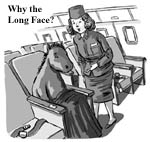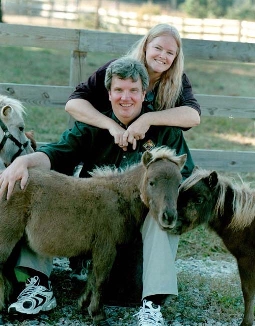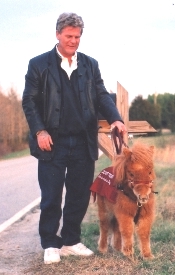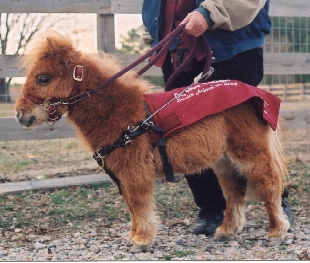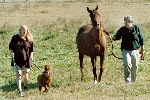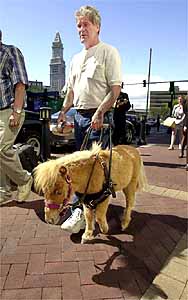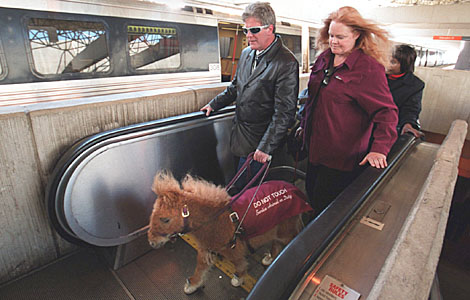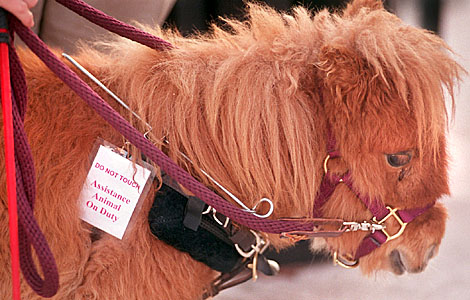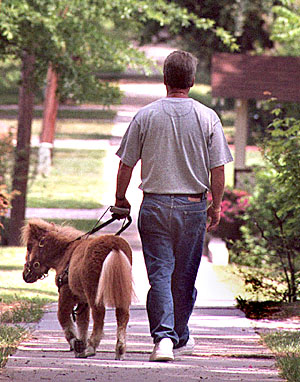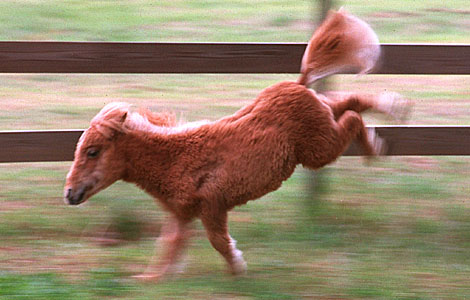|
|
Ridgewood Homeowners Assn. v. Mignacca
Rhode Island Superior Court
2001 WL 873004
July 13, 2001
Summary of Opinion
Plaintiff homeowners association brought a lawsuit for a court order
that defendant Mignacca must not keep their miniature horse Sonny on
their 4 acre property. The plaintiffs claim that keeping the miniature
horse violates both town zoning ordinances and restrictive covenants of
the subdivision in which the defendants lived.
In this superbly-written, urbane, and humane opinion, the trial court
denies the association’s claims. The judge found that the zoning
ordinance does not prohibit keeping Sonny and that properly interpreted
the restrictive covenants do not prohibit keeping pets such as Sonny.
Accordingly, the court denies relief to the plaintiffs and permits Sonny
to remain on the Mignacca’s property.
Text of Opinion
This case presents the Court with the question of whether Kathy and
David Mignacca and their four minor children may lawfully keep Sonny,
their miniature horse, at the family's residence in the Ridgewood
subdivision of western Cranston. The Mignacca family, the Ridgewood
Homeowners Association and those property owners and residents of the
Ridgewood subdivision who contend the Mignaccas cannot lawfully harbor
Sonny have brought the controversy before the Providence County Superior
Court by way of two paths.
On April 11, 2001, the Zoning Board of Review of the City of
Cranston, after hearing from the Mignaccas, Rena Dresseler, the
president of the Ridgewood Homeowners Association and a vigorous
opponent of Sonny's residing in Ridgewood, as well as other persons
supportive of and opposed to the Mignaccas' position, granted the
Mignaccas' petition for a variance and allowed them to keep Sonny on
their nearly four acre lot, subject to certain conditions. From that
decision, the Ridgewood Homeowners Association, Ms. Dresseler and others
claimed an appeal to this Court. On the 22nd day of May, 2001, the
Ridgewood Homeowners Association, Rena Dresseler and other individual
homeowners from Ridgewood went on the offensive against the Mignaccas
and Sonny, and filed a verified complaint seeking injunctive relief to
bar the Mignaccas from keeping Sonny on their property and from erecting
and maintaining a shed to shelter the miniature horse, the plaintiffs'
contention in this suit being that restrictive deed covenants prohibited
Sonny from being kept in Ridgewood. A temporary restraining order was
issued by this Court May 23, 2001 enjoining the Mignaccas from keeping
Sonny on their property until the matter was finally adjudicated on the
merits. A counterclaim challenging the keeping of any animals by the
plaintiffs, other than cats and dogs, was filed by the Mignaccas on July
11, 2001.
On June 27, 2001, the parties and their attorneys appeared in this
court prepared to try the equitable matter, not just on the question of
a preliminary injunction but on the merits, pursuant to Rule 65 of the
Rhode Island Rules of Civil Procedure. On July 2, 2001, the zoning case
and the equity case were consolidated for trial on the merits, with the
attorneys for the Mignaccas, the Ridgewood Homeowners Association and
individual members of the association who have joined in the litigation,
and the Cranston Zoning Board of Review, all concurring that this was
the appropriate way to proceed. It is well established, of course, that
equity seeks to avoid a multiplicity of suits and that R.I.G.L. §
8-13-2, the legislative grant of equitable powers to the Rhode Island
Superior Court, provides for consolidation of all matters arising out of
the same occurrence or transaction. See also Rule 42, Super. R. Civ. P.
This Court, sitting without a jury, took testimony during a number of
half-day sessions, commencing on June 27, 2001 and ending on July 12,
2001. The principal facts of significance are not in dispute; and
indeed, counsel for the Mignaccas and for the Association have
stipulated to a number of facts.
Christian Mignacca, the nine-year old son of Kathy and David Mignacca,
was the first to testify in this matter, and I find his testimony to be
credible and trustworthy. Christian answered all questions put to him by
counsel and the Court in a forthright and articulate manner. He spoke of
his involvement with the training of Sonny during Sonny's stay of
approximately thirty days at his home before the issuance of the
temporary restraining order; and he discussed the behavior of the
miniature horse both while it is housed on the Mignacca property and
when it participates in horse shows and competitions at venues designed
for that purpose. Christian explained that he has won a number of
ribbons while competing with Sonny against other miniature horses and
their masters. While Kathy Mignacca and Christian's sister, Nicole, also
participate with Sonny in such contests, it is clear that Christain's
involvement with the training and showing of the little horse is
significant. Christian also discussed his physical limitations resulting
from bacterial meningitis when he was two.
From Kathy Mignacca, whom I also find to be a credible witness,
Christian's activities with Sonny were confirmed, and the Court was also
told that Christian's involvement with Sonny and the miniature horse
competitions has been a great source of enjoyment and satisfaction for
the boy, and indeed has been helpful for his confidence and self-esteem,
given the fact that his early childhood bout with the often fatal
disease of bacterial meningitis has left Christian with scarring over
much of his body, including his face and arms, and with weakened legs
that require him to wear braces frequently. His weakened limbs preclude
him from participating in other competitive sports appropriate for his
age, such as baseball, soccer or football, and he finds the delights and
challenges of competition in the horse shows he enters with Sonny.
Regarding Sonny himself, the Court learned of his behavior, habits
and growth potential from Christian and Kathy Mignacca, and had the
opportunity to observe Sonny on the Mignacca property during a view on
July 6, 2001. Sonny's shoulders will never be higher than 3 feet from
the ground and his weight will never exceed 150 pounds. The animal, by
all descriptions, as well as by the Court's view on July 6, is gentle,
amiable and not high strung or vicious in the least. His stature and
weight will never reach that of a Great Dane, a Bull Mastiff, or a Saint
Bernard; and it is unlikely that any training could make him into a
guard or attack animal along the lines of a Doberman Pincher, a German
Shepherd or a Pit Bull. Indeed, the popular name for this
animal--"miniature horse"--is an apt one. When Shakespeare's Richard III
cried out to his deity and the fates to supply him with a horse in
return for his kingdom, if Sonny (or one of his ancestors) had appeared
from the underbrush into the clearing, the distraught king surely would
have uttered an Anglo-Saxon expletive that would make an Elizabethan
audience blush and then fallen on his sword. [FN1] Alas, Sonny the
miniature horse cannot be ridden nor used to pull a plow through a
field.
FN1. "A horse! A horse! My kingdom for a horse!" from William
Shakespeare, King Richard III, Act V, Scene 4.
The defendants also presented Anthony DelFarno, a Ridgewood neighbor,
who testified that for nearly two years between 1998 and 2000, his
family kept a miniature horse on his property, and that at least one
board member, Laurie Biern, had seen the horse, Pogo. According to Mr.
DelFarno, Ms. Biern liked the little animal, and he never received any
complaint from the board of directors or any other person regarding his
keeping the animal. He made no attempt to conceal the fact Pogo was on
his premises, and the miniature horse could be viewed from the street.
In order to properly care for the horse, Mr. DelFarno converted a
portion of his 15 x 25 foot shed into an appropriate place for Pogo. At
some point, he received a letter signed by Ms. Dressler in her capacity
as President of the Ridgewood Homeowners Association telling him that
the shed was in violation of the restrictive covenant pertaining to the
building of such structures, apparently, Section 6, which provides,
among other things, that "no structure ..., shack ... or other
outbuilding shall be used, placed, erected or constructed on any lot at
any time either temporarily or permanently." Upon receiving the letter,
Mr. DelFarno said that he called each member of the board, and none of
them had any information or even noticed that there was any problem with
his shed. As his testimony was uncontradicted, the only conclusion to be
drawn by the Court is that Ms. Dressler, without advising other board
members, took it upon herself to tell Mr. DelFarno that his shed was in
violation of the restrictive covenant. For his part, Mr. DelFarno
advised Ms. Dressler, and apparently anyone else with whom he spoke,
that he would take his shed down only if the other cabanas, sheds, and
outbuildings scattered throughout the subdivision were also removed by
their owners. Mr. DelFarno opined that the homeowners association
enforced its covenants arbitrarily.
In their case seeking equitable relief, the plaintiffs called no
witnesses to the stand, though Rena Dresseler testified when called by
the Mignaccas. Ms. Dresseler testified that she had occasionally heard
Sonny neigh while she was on her property some three or four hundred
feet away from where the Mignaccas keep Sonny in a fenced enclosure. It
is difficult to believe that Sonny could be heard from that distance, as
his neigh, such as it is, is more akin to a cat's meow and apparently
does not occur very frequently according to Kathy Mignacca. When the
group of approximately fifteen people who went on the Court's view
approached Sonny in his enclosure, the sound made by the footfalls was
noticeable and at least three persons in the entourage carried large
television cameras on their shoulders. This was probably not a sight
that Sonny had encountered in the past, yet his reaction was one of
silent indifference as he continued his equine ruminations. Counsel for
the Association was invited by the Court to attempt to make Sonny emit a
sound, but the invitation was declined. Kathy Mignacca declared that the
horse would neigh usually when presented with food. In the presence of
those who were attending the view, Kathy Mignacca entered the enclosure
and offered food to Sonny, who obliged with a neigh--of the feline meow
variety--which could barely be heard 20 feet away.
During her testimony, Ms. Dresseler also disclosed that at some point
in the past, she had kept a 4 foot boa constrictor as a pet and was
presently keeping on her premises three iguana lizards, and three or
more stray cats that she regularly fed and who stayed under her outside
deck. Additionally, she has on her premises two parrots.
During the view, Ms. Dresseler's residence was also visited by the
Court and counsel for the Mignaccas and the Association. From her deck,
one can look across the adjoining backyard and pool of the Nardolillo
family and get a glimpse of portions of the Mignaccas' garages and the
top of a slide that has been placed near their swimming pool. The
Mignacca pool and house cannot be seen, nor can the enclosure and shed
in which Sonny is kept. Sonny himself, could not be seen, but Ms.
Dresseler ascribed that to the fact that a pile of dirt resulting from
excavation in the Nardolillo's backyard obscured the view. As the fact
finder, I conclude that even without the dirt in the way, the stands of
trees, shrubs, bushes and plants on three parcels of land would make a
view of Sonny difficult, if not impossible; and if one did chance to
catch a glimpse of Sonny from the Dresseler deck, the miniature horse
would appear as a tiny denizen of Lilliput, the island Gulliver visited
in his famous travels. Sonny, it should be noted, is kept behind the
Mignacca house and to the rear of their property, and cannot be observed
readily, if at all, from the street. The Mignaccas have created for
themselves, through planting and landscaping, a park-like environment.
All the houses in Ridgewood are what might be termed, by way of
understatement, upscale and lavish. Ridgewood, in short, is a verdant
and secluded enclave for some members of Rhode Island's economic
aristocracy.
At several times during the course of these proceedings, counsel for
Ridgewood and Ms. Dresseler argued that David and Kathy Mignacca were
exploiting the afflictions of their son, Christian, in order to gain the
favor of the Court, as well as popular sympathy by way of media
manipulation, for whatever good that might gain them. The genesis of
this contention apparently is Ms. Dresseler, who obliquely opined during
her testimony at the zoning hearing that the Mignaccas were seeking to
use the condition of Christian to gain the favor of the zoning board.
(Tr. 22). Kathy Mignacca testified in this proceeding that she and Ms.
Dresseler had a confrontation about this accusation after the Zoning
Board of Appeals had taken testimony and rendered its decision. These
suggestions by Ms. Dresseler and her lead attorney on this point are
reckless, mean-spirited and not supported by one iota of evidence. On
the contrary, the transcript of the April 11, 2001 zoning hearing
demonstrates that from the outset Kathy Mignacca has been candid and
forthright about the salubrious affect playing and working with Sonny
could have on Christian. (Tr. 9, 13-14). This Court takes judicial
notice of the emotional and physical well being animals kept as pets
often bring to their human companions [FN2].
FN2. A number of scientific studies have confirmed what any
casual observer of pets interacting with humans should know. See,
e.g. Alan M. Schoen, Kindred Spirits: How the Remarkable Bond
Between Humans and Animals Can Change the Way We Live (2001).
But, while relevant, it is not the physical and psychological
challenges that Christian confronts as a result of his bout with
bacterial meningitis that govern the outcome of this case. The paramount
concerns of this Court in resolving the controversy are the ordinances
of the City of Cranston, the decisional law of the Rhode Island Supreme
Court respecting restrictive covenants, and the principles and maxims of
equity. Logic suggests that the first point of examination be the
Cranston City Code, for if Sonny's residing with the Mignaccas is
prohibited by the ordinances of Cranston, then an examination of the
restrictive covenants is pointless.
Land Use and Zoning Ordinances in Cranston
On April 11, 2001, the Mignaccas pressed their request pursuant to §§
30-8 and 30-28 of the Cranston zoning ordinances before the Zoning Board
of Appeal. Section 30-28 provides for a procedure to obtain variances
and § 30-8 is a schedule of uses. Apparently the Mignaccas were
concerned about permitted uses in an A-80 zone, which allows not only
single-family residences on large lots but provides for the "raising and
keeping of animals on not less than ten acres." The Board took testimony
for and against the application, and learned, among other things, that
Sonny would be kept in a 10 foot by 12 foot shed if the Board so
permitted, would be spending his days in an enclosure bordered by a 500
foot fence that in turn was within the Mignaccas fenced-in property, and
that Sonny required approximately one-half acre for his exercise. The
Zoning Board of Review granted the request of the Mignaccas to keep
Sonny on their property along with the 10 foot by 12 foot shed, subject
to certain conditions; and the Board was specific in its decision that
they had factored in the concerns of Kathy Mignacca for the well being
of Christian. While the Board of Review did not fully explicate its
decision, they granted a dimensional variance from the 10 acre
regulation relative to "raising and keeping ... animals", implicitly
concluding that Christian would experience more than a "mere
inconvenience." (R.I.G.L. § 45-24-41(d)(2)). One condition imposed by
the Board was that the horse could remain "as long as [Christian] ... is
living there or no more than nine years whichever comes first.."
A review of Cranston's ordinances reveals, however, that the
Mignaccas are able to keep Sonny on their property without repairing to
the Board of Appeals for a variance, as § 4-2.1 of the City Code
provides that horses may be kept in different sections of the city so
long as sufficient acreage is available. Section 4-2.1 entitled "Keeping
animals in certain districts prohibited," a certified copy of which was
placed in evidence by the Court, provides, in pertinent part:
No person shall keep any horse within any closely built-up
residential area unless he shall have available, either through
ownership or lease, at least 20,000 square feet of pasture area.
As an acre contains 43,560 square feet, and the Mignaccas have a four
acre house lot, there does not appear to be any question but that they
can keep a miniature horse on their property. The word "pasture" of
course refers to grass growing on land that has not been tilled for
cultivation and which is available for an animal to graze upon.
The City Council of Cranston was acting within powers delegated to it
by the legislature when it passed § 4-2.1 respecting the keeping of a
horse in a built-up residential area. R.I.G.L. 23-19.2-1 provides, in
pertinent part:
The councils of the several cities and towns may make such rules
and regulations as they deem necessary to regulate and control the
construction, location and maintenance of all places for keeping
animals ...
No authority has been presented to this Court that in any way
suggests that either the zoning ordinances of the City of Cranston, the
Cranston comprehensive plan or the statutory enabling legislation
nullify the controlling force of § 4-2.1.
Restrictive Covenants
I turn now to an examination of the restrictive covenants at issue in
this controversy. The document containing all restrictive covenants
pertaining to the parcels located in Ridgewood Estates is Exhibit A in
the consolidated action.
Restriction 8, titled "Livestock and Poultry ", provides in its
entirety:
No animals, livestock or poultry of any kind shall be raised,
bred, or kept on any lot, except that two (2) dogs and/or two (2)
cats may be kept provided that they are not kept, bred or maintained
for any commercial purpose. No kennels or other structure for the
keeping of such pet shall be maintained on the premises.
The plaintiffs also rely on Restrictive Covenant 5, which defines
nuisances; and after amending their complaint, the plaintiffs sought to
demonstrate that the Mignaccas used offensive construction or lawn
machinery and recreational vehicles on their land, in addition to
keeping Sonny. Restrictive Covenant 5, titled "Nuisances ", provided in
its entirety:
No professional, trade, business or commercial enterprise of
whatsoever nature may be conducted or operated on the granted
premises. No substance, thing or material shall be kept of used on
any lot which will emit foul or obnoxious odors or that will cause
any noise that will or might disturb the peace, quiet, comfort or
serenity of the occupants of the surrounding property.
It is necessary for this Court to determine the intended scope of
Restrictive Covenant 8. Rena Dresseler and the Ridgewood Homeowners
Association argue strenuously that Sonny should be placed under the
category of "livestock" and therefore cannot be kept on the Mignaccas'
Ridgewood property. Our legislature has seen fit to define the term
"livestock" in contradistinction to the word "pet" in an effort to
categorize different members of the animal kingdom. In R.I.G.L.
4-13-1.2(5), we find the following definition of livestock:
"Livestock" means domesticated animals which are commonly held in
moderate contact with humans which include, but are not limited to,
cattle, bison, equines, sheep, goats, llamas, and swine.
R.I.G.L. 4-13-1.1(8) favors us with us a definition of pets:
"Pets" mean domesticated animals kept in close contact with
humans, which include, but may not be limited to dogs, cats,
ferrets, equines, llamas, goats, sheep, and swine.
It appears, then, that the legislature recognized that horses--as
well as some other animals such as, llamas, goats, and even swine--can
be categorized as either livestock or pets, the different labels to be
applied according to the degree of contact the animal has with humans.
In the instant matter, it is clear that Christian, and some other
members of his family, have close contact with Sonny and treat him as a
pet as they engage in almost daily routines with him involving feeding,
training, grooming, playing and showing in horse competitions.
In addition to their contention that Sonny must be placed under the
rubric "livestock", the plaintiffs argue that this restrictive covenant
must be read to bar the keeping of any animals except two dogs and/or
two cats per lot on property situated in Ridgewood.
In seeking to determine the intent of the drafter of this covenant,
the principles of statutory construction as enunciated by the Rhode
Island Supreme Court and other authorities provide a guide. One rule of
construction is that "general terms be construed as limited by more
specific terms." Montaquila v. St. Cyr, 433 A.2d 206, 214 (1981). It
appears that the all-inclusive term "animal" has been limited by the
words used in the title of the covenant, "Livestock and Poultry," and
further limited by the use of those same words following immediately
upon the use of the word "animal" in the text. Also apposite is the
"principle of noscitur a sociis, that the meaning of one word can become
clear by reference to other words associated with it in the statute ..."
Berthiaume v. School Com. of Woonsocket, 121 R.I. 243, 248 (1979). [FN3]
FN3. A scholar of the rules of interpretation provides useful
instruction: "Noscitur a sociis ", the most sonorous of the canons
of construction, is also the most obscure. It is often confused with
ejusdem generis even by those who should know better. Whereas
ejusdem generis tells us how to find items outside the list
expressed in the statute, noscitur a sociis tells us how the list
gives meaning to the items within it. Michael Sinclair, A Guide to
Statutory Interpretation (2000).
Naturally, to resolve ambiguities or a lack of clarity of intent, the
restrictive covenant must be read in its entirety and harmonized with
every other covenant in the deed. The plaintiffs pled that they
perceived a breach of the livestock and poultry provision (Restrictive
Covenant 8) and also pled that the Mignaccas were in violation of the
nuisance provision (Restrictive Covenant 5) in keeping their horse and
shed on their land. Not one shred of evidence was produced suggesting
that either Sonny or the 10 foot by 12 foot shed produced any sort of
nuisance, either by way of emitting noxious odors, disturbing the peace
or by creating an eyesore. This Court can judicially note that a greater
noise level than could ever be generated by Sonny would result from any
number of usual Ridgewood activities, such as backyard barbecues,
teenager pool parties, barking dogs and the chirping of crickets after
dusk.
I conclude that the intent of the drafter of Restrictive Covenant 8
was to provide the residents and potential residents of the Ridgewood
development from having a neighbor or neighbors engage in the business
of keeping and raising animals in a farm-like setting for commercial
purposes, i.e., the raising of chickens for their eggs and meat, the
raising of cattle for dairy products, the maintaining of a horse stable
for riding lessons and to make a profit by boarding other people's
horses, etc.
Additionally, the covenant is unclear as to whether such animals as
are barred by Restrictive Covenant 8 are precluded from only the outside
of a dwelling place or whether they are barred from the inside as well.
The lead individual plaintiff, Rena Dresseler, asserts a right to keep
parrots, lizards and snakes within her house, claiming that Restrictive
Covenant 8 applies only to land outside the house. This viewpoint is
mistaken and not supported by the language of the covenant. At best, the
covenant is ambiguous as to the scope of its application, as the use of
the words "lot" and "premises" within the covenant do not by and of
themselves bespeak of any distinction between the area situated inside
the house and that located outside. Controlling authority of our Supreme
Court directs how this ambiguity is to be resolved:
... the general rule concerning restrictive covenants is that
they are to be construed strictly so as to favor an unrestricted use
of property, are not to be extended by implication, and if there is
ambiguity, it is to be resolved in favor of an unrestricted use.
Emma v. Silvestri, 101 R.I. 749, 751 (1967).
Following Emma, this Court concludes as a matter of law that such
animals as may be kept at the residences in Ridgewood may be kept either
inside or outside the actual dwelling in the discretion of the owners.
This parsing of the language of the restrictive covenants and an
examination of the entire document creating these deed restrictions is
consonant with the law governing judicial scrutiny of such documents, as
found in Gregory v. State, Dept. of Mental Health, Retardation and
Hospitals, 495 A.2d 997 (R.I.1985) and DeWolf v.. Usher Cove Corp., 721
F.Supp. 1518 (D.R.I.1989). Of particular concern to this justice is the
mandate that "restrictive covenants are to be strictly construed in
favor of the free alienability of land while still respecting the
purposes for which the restriction was established." Hanley v. Misischi,
111 R.I. 233, 238 (1973). Also, because of the different fact patterns
that emerge in each dispute regarding land use and plats or subdivisions
subject to restrictive covenants, these controversies must be decided on
a case-by-case basis. Hanley, 111 R. I., at 238. And as former Chief
Judge Pettine wrote in DeWolf, after surveying Rhode Island law,
restrictive covenants should generally be viewed "as creating a valid
contractual relationship so long as they are not contrary to public
policy or law or are not unreasonably or arbitrarily enforced." DeWolf,
721 F.Supp., at 1528.
In addition to containing the ambiguities already discussed above,
the restrictive covenants involved in this matter, especially
Restrictive Covenant 6, "Temporary Structures " and 8, "Livestock and
Poultry ", have been enforced arbitrarily or not at all. Rebuttal
witnesses called by the plaintiff testified to the effect that the
original developer went bankrupt around 1994 and from that time forward
there was no mechanism for the enforcement of the covenants. This meant
that during this time people could build on their property and keep
animals in violation of the restrictive covenants. Indeed, during the
view, freestanding garages, as well as in one case a garage built under
a house, all in contravention of the restrictive covenants, were
observed, as was a driveway built without regard to the specifications
found in the covenant. Testimony was presented by witnesses for both the
plaintiff and the defendant that indicated the existence of sheds and
cabanas throughout the plat in violation of the covenants, at least
according to the perception of the person giving the testimony. None of
these covenant "violations" seemed to detract in any way from the
manicured and upscale ambiance of the neighborhood. However, the
rebuttal witnesses were mistaken in their declarations that as residents
of Ridgewood they were powerless to enforce any perceived violations of
the covenants until the plaintiff Homeowners' Association was created
around 1998. As the Rhode Island Supreme Court said in Houlihan v.
Zoning Board of New Shoreham, 738 A.2d 536, 538 (1999):
This court has long recognized that when recorded plat-lot
restrictions appear intended to provide for a uniform development and
use of platted subdivision lots, any one of the plat-lot owners may seek
judicial assistance to compel compliance of another lot owner with the
restrictive covenants.
In effect, between 1994 and 1998 there was a holiday in Ridgewood
from the mandates of all the restrictive covenants. While an expert real
estate broker and appraiser, one Donald Coletti, called by the
plaintiffs, testified as to the efficacy of restrictive covenants in
preserving the character of a neighborhood, he had nothing to say about
the deleterious affects of any specific violations on Ridgewood. He
further testified that he had participated in the transfer of the
Mignacca home from its former owners, and that he from time to time
engaged in the sale of other homes in this section of Cranston. At the
time he testified, he was trying to sell a home in Ridgewood Estates and
had not been able to bring about the sale as quickly as he would have
liked; but none of this was attributed to the Mignaccas and their
keeping of Sonny on their property, or to any other violation by any
person regarding the restrictive covenants.
Not only was there a four year hiatus in the enforcement of these
restrictions, though no resident of Ridgewood was obliged to stay his or
her actions regarding any perceived violation, it is clear that the
president of the association has kept animals on her property, the
existence of which were known to other members of the association. As
noted above, the DelFarno miniature horse, Pogo, was also known to at
least one member of the board of directors of the association and
presumably known to many other residents of the subdivision, as the
animal was observable from the street. The board member, Laurie Biern,
testified that she believed the horse was there for only three months
and that the reason she did not report it was that she thought the
DelFarnos were simply taking care of the horse for a short period of
time as an act of mercy because the horse, according to Ms. Biern, was
undernourished when the DelFarnos acquired it. She described herself as
an animal lover who regularly takes in stray animals, including "wild
cats" in order to nurse them to health.
This Court concludes that the restrictive covenant relative to
livestock and poultry is now being applied arbitrarily to the Mignaccas.
There is no exception in Restrictive Covenant 8 that provides for
miniature horses to be kept so long as they are being nursed to health.
In fact, as Rene Dressler testified, there are no written rules,
regulations, or guidelines of any type or description that contain
criteria as to when an exception may be granted relative to the
enforcement of Restrictive Covenants 5, 6 and 8. As I indicated above,
the intent of the drafters of the restrictive covenants was not to bar a
pet such as Sonny, but rather to prohibit cattle and horse farms,
chicken coops and the like. Nonetheless, another factor in this Court's
decision is the arbitrary enforcement, or non-enforcement, of the
covenants.
Equity
The keeping of animals other than dogs and cats by Rena Dresseler,
the regular harboring of animals by Ms. Biern, including a litter of
"wild cats", the keeping of more than two dogs or two cats by other
residents of Ridgewood, and the failure of any action to be taken
against the DelFarnos and "Pogo" by the plaintiffs, not only show an
arbitrary enforcement of Restrictive Covenant 8 but place in front of
the plaintiffs an insurmountable barrier regarding the equitable maxim,
"He (or she) who seeks equity must do equity." This maxim is not to be
confused with the clean hands doctrine. [FN4] The fundamental equitable
maxim that I rely upon declares, in effect, that one who seeks to invoke
the equitable and extraordinary injunctive power of the court relative
to a claimed covenant violation cannot himself or herself be in
violation of that same restriction, or have ignored other similar
violations by other persons. It would be manifestly unfair for members
of the association or other residents of Ridgewood to keep snakes or
parrots or three dogs while denying Christian and the Mignaccas a right
to keep their miniature pet horse Sonny. Moreover, the plaintiffs have
not proved harm--let alone irreparable harm--to their respective
properties or to any rights they enjoy. The plaintiffs would like this
Court to believe that without injunctive relief the Mignaccas' property
will have the appearance of a cross between Old MacDonald's Farm and
Noah's Ark situated on Tobacco Road, but nothing in evidence suggests
this.
FN4. See, e. g. John Pomeroy, II Trestise in Equity
Jurisprudence, (1941 ed.) Pomeroy declared this maxim to be "the
foundation of all equity", p. 51, and treated it in a separate
section, Section III, from that in which he examined "clean hands."
Section IV.
"The decision to grant or deny an injunction is a matter within the
sound discretion of the trial court." Paramount Office Supply Co. v.
D.A. MacIsaac, Inc., 524 A.2d 1099, 1101 (R.I.1987). Putting aside for
the moment my analysis of the restrictive covenants that appears above,
the plaintiffs have not produced any evidence whatsoever that indicates
that Sonny and the shed he uses constitute a nuisance. In my view, it is
doubtful that he can be heard beyond the boundaries of the Mignacca
lots, and if his gentle whinny happens to ride a breeze on to some
neighbor's property the sound will be barely audible, and certainly not
anywhere as loud as the barking of even a small dog. There was no
testimony as to any odors coming from Sonny or the manure he generates;
and this is not surprising as the horse during the view was immaculately
groomed; and Ms. Mignacca testified that the manure is collected
regularly by the family and kept in sealed bins (which were displayed on
the view) until its removal from the property. No evidence was produced
indicating that Sonny's presence will in any way inhibit neighbors from
the free and untrammeled use of their own property, nor will his
presence diminish property values. Balancing the equities--and again
keeping to one side my determination that Restrictive Covenant 8 does
not preclude the keeping of a miniature horse--none of the plaintiffs
experiences any hardship by the Mignaccas keeping Sonny. Balancing the
equities, the Mignaccas have found a gentle pet and wholesome activity
for Christian, whose weak legs, problematic growth plates and braces
prevent him from participating in other competitive activities, such as
baseball and football, with his friends and other children of his age,
and this clearly outweighs the undifferentiated fears of the Homeowners
Association and the individual plaintiffs.
Plaintiffs argue strenuously, but without supporting evidence, that
Sonny will drive down property values, if not throughout the
development, at least regarding nearby homes. Based on the evidence
presented before this Court, Sonny's presence will cause no such
problem; but it is likely that if the Ridgewood Homeowners Association
develops a reputation that its leadership is unnecessarily and
unreasonably zealous and brings homeowners to court for unobtrusive
activities designed to meet the needs of a special child, then the
owners in Ridgewood may find the marketability of their premises
declining. Nothing in this decision is meant to suggest that Christian,
or any other child living in Ridgewood, can flaunt clear, sound and
appropriate restrictive covenants. If Christian wished to keep a herd of
cattle because he and his parents thought it in his best interest to do
so, or if he and his parents concluded that playing the drums in his
backyard at one o'clock in the morning was a satisfying and beneficial
activity, he would find no protection in this Court. He and his family
are protected here today for the reasons set forward above. Accordingly:
(1) In Ridgewood Homeowners Association, et al. v. Cranston Zoning
Board, et al., 01/PC-2241, pursuant to R.I.G.L. 45-24-69(d), this Court
affirms the ultimate decision of the Cranston Zoning Board of Review
respecting the lawful right of the Mignaccas to keep Sonny on their
property and house him in the shed they erected for that purpose, but
the case is remanded and the Cranston Zoning Board of Review is directed
to declare in their decision in their record of this case that because
the Mignaccas have well in excess of 20,000 square feet on which to
permit Sonny to amble and graze, Cranston Ordinance 4-2.1 precludes the
necessity of granting a dimensional or any other variance to the
Mignaccas, as that ordinance allows the keeping of a horse, even in a
built-up area, so long as the owner has more than 20,000 square feet for
use as a pasture.
(2) Because Restrictive Covenant 8 does not apply to Sonny, the pet
miniature horse, and because a number of sheds and cabanas exist
throughout Ridgewood in apparent violation of Restrictive Covenant 6,
which permits no exceptions, the temporary restraining order earlier
issued in this matter is vacated; and the Mignaccas may keep Sonny on
their property and house him in the ten by twelve shed that exists
there; and if further construction is required to complete the shed, the
Mignaccas may undertake that;
(3) The counterclaim brought by defendants is denied, as there has
been no showing that any of Rena Dresseler's animals are either
proscribed by Restrictive Covenant 8 or constitute a nuisance under
Restrictive Covenant 5; similarly, the plaintiffs are denied injunctive
relief regarding defendants' pet ducks, rabbits and fish, none of whom
have been proved to be a nuisance;
(4) Counts 5 through 14 of the plaintiffs' amended complaint are
denied for failure of proof; and this Court finds as a matter of fact
that the defendant Mignaccas maintain their property in a neat and
pristine way and keep it within the tenor of the neighborhood; and the
plaintiffs failed to show that any recreational vehicles or equipment
used for excavation or lawn maintenance are occasionally visible from
the street or readily visible by any abutting property owner; and they
have failed to prove that if they are occasionally visible to the
curious or the hyper-critical they constitute a violation of any
restrictive covenant or an eyesore; and indeed, most of the objects
complained of were stored in a garage, where there is ample room to
store the other objects observed carefully parked in the driveway;
Final judgment reflecting this decision shall enter today.
|

